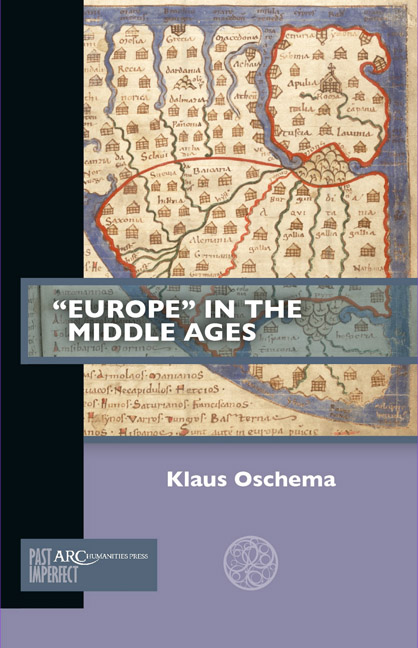Book contents
- Frontmatter
- Contents
- List of Illustrations
- Preface and Acknowledgements
- Chapter 1 Why Europe? A Concept Crossing History and Politics
- Chapter 2 Foundations in Antiquity
- Chapter 3 Moments of Transformation— Europe in the Early Middle Ages
- Chapter 4 Europe, Christianity, or Something Completely Different? Impressions from the Central Middle Ages
- Chapter 5 Our Last Hope? Entangling Europe and Christianity in the Late Middle Ages
- Chapter 6 Perspectives from Outside? Byzantium and the Arabic World
- Conclusion No Roadmap for Europe— History, Politics, and the Way to Global History
- Further Reading
Conclusion - No Roadmap for Europe— History, Politics, and the Way to Global History
Published online by Cambridge University Press: 13 February 2024
- Frontmatter
- Contents
- List of Illustrations
- Preface and Acknowledgements
- Chapter 1 Why Europe? A Concept Crossing History and Politics
- Chapter 2 Foundations in Antiquity
- Chapter 3 Moments of Transformation— Europe in the Early Middle Ages
- Chapter 4 Europe, Christianity, or Something Completely Different? Impressions from the Central Middle Ages
- Chapter 5 Our Last Hope? Entangling Europe and Christianity in the Late Middle Ages
- Chapter 6 Perspectives from Outside? Byzantium and the Arabic World
- Conclusion No Roadmap for Europe— History, Politics, and the Way to Global History
- Further Reading
Summary
At the end of this brief overview—which has covered no less than an entire millennium!—many questions necessarily remain open, not least what all this means for us today. In recent years, the idea(l) of the nation-state has once again become prominent. So prominent, in fact, that it visibly endangers the accomplishments of a long-term process of political, administrative, and cultural unification in Europe that had and has several objectives—including securing peace between the member states of the European Union (and beyond).
As we have seen, the experience of the World Wars was a major motivation for historians of the post-war period to analyze the Middle Ages in European terms. Several decades after the first pioneering works, the results remain ambivalent: analyses that consciously apply a European framework to medieval history are no longer rare, but many publications still tend to choose the modern borders between nationstates as their frame of reference. As to the more conceptual approaches that seek to analyze the history of the “idea” of Europe, the outcomes are equally hard to gauge. Some of the initial results presented by Fischer, Hay, and others, clearly must be revised: Europe was neither a “rare” notion in medieval texts (especially since it is hard to evaluate exactly how many—or how few—appearances might justify such a qualification), nor was it “purely geographical.” The latter insight is of some importance if we want to adequately describe the mental landscape of the people who lived in the period that we call the Middle Ages. In a cultural setting where the material world was interpreted as God's creation and where everything could acquire symbolic value as a representation of the creator's work, the very idea of the “purely geographical” seems out of touch. And while Europe basically never became a clear-cut political concept during the Middle Ages (in this respect Fischer and Hay were certainly right), it still acquired significant and wide-ranging cultural connotations.
But what might the insights into these connotations tell us today? For one thing, they allow us to avoid misunderstandings that often lead to the misuse of history: Charlemagne certainly did not perceive himself as a “European” ruler, though historians and politicians of the mid- and late twentieth century were quite successful in presenting him as such.
- Type
- Chapter
- Information
- 'Europe' in the Middle Ages , pp. 119 - 122Publisher: Amsterdam University PressPrint publication year: 2023

